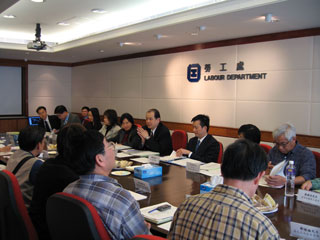Anuual Report 2006
Chapter 3
Labour Relations
The Programme of Labour Relations
www.labour.gov.hk/eng/labour/content.htmIn Hong Kong, employer and employee relations are largely premised on the freely negotiated terms and conditions of employment entered into between the two parties. Employers and employees in Hong Kong are free to form trade unions and participate in union activities. Trade unions are required to be registered under the Trade Unions Ordinance. The objective of the Labour Relations Programme is to maintain and promote harmonious labour relations in the non-government sector. We achieve this by:
- giving advice on matters relating to conditions of employment, provisions of the Employment Ordinance and good people management practices;
- providing voluntary conciliation service to help employers and employees resolve their employment claims and disputes;
- promoting understanding of labour laws and encouraging good labour management practices;
- adjudicating minor employment claims speedily through the Minor Employment Claims Adjudication Board; and
- registering and regulating trade unions to bring about sound and responsible trade union administration.
The principal legislation administered by this programme area includes the Employment Ordinance (EO), the Labour Relations Ordinance, the Minor Employment Claims Adjudication Board Ordinance and the Trade Unions Ordinance (TUO).
With the provision of a comprehensive set of employment standards, the EO is the main piece of legislation governing conditions of employment in the non-government sector. The procedures for settling labour disputes in the non-government sector are provided in the Labour Relations Ordinance. The Minor Employment Claims Adjudication Board Ordinance establishes a machinery known as the Minor Employment Claims Adjudication Board (MECAB) to adjudicate minor employment claims when settlement cannot be achieved by conciliation. For the regulation of trade unions, the TUO provides a statutory framework for trade union registration and administration.
Our Work and Achievements in 2006
Key Indicators of Work
Some key indicators of work of the Labour Relations Programme Area are contained in Figure 3.1.
Amendments to the Employment Ordinance
In 2006, the EO was amended to raise the maximum penalty for wage offences to a fine of $350,000 and imprisonment for three years so as to enhance its deterrent effect. Amendments were also made to the EO to recognise the medical treatment, examination and certification given by registered Chinese medicine practitioners for the purpose of employees' entitlement to benefits under the EO.
In December, we introduced an amendment bill into the Legislative Council to modify the existing mode of calculation of statutory entitlements under the EO in order to ensure that all components of wages as defined under the Ordinance (including commission and allowance, etc) are included in the calculation of relevant statutory entitlements.
Our consultation and conciliation services have contributed to the maintenance of industrial peace. In 2006, we handled 101 516 in-person consultations, 199 labour disputes and 24 958 claims. The number of labour disputes and claims handled in 2006 was down by 4 per cent compared with the figure of 26 189 cases in 2005. It was the lowest since 1998. Altogether 70.7 per cent of the cases handled in 2006 were resolved amicably through conciliation, the highest settlement rate since 1994. Three strikes were recorded in 2006. As a result, the number of working days lost per thousand salaried employees and wage earners was 0.02, among the lowest in the world. (Figures 3.2 - 3.7)
Proactive Efforts to Combat Wage Defaults
In 2006, the Labour Department maintained its proactive strategy to tackle the problem of non-payment of wages at source. In addition to enhancing publicity and promotion, and stepping up enforcement and prosecution, we made use of the early warning system set up in collaboration with trade unions to gather intelligence on non-payment of wages. The Operation COMBAT continued to proactively forestall problematic restaurants from evading their liabilities to pay wages. The exercise achieved notable results. To enhance the deterrent effect of the EO on wage offences, the maximum penalty for wage offences had been raised from a fine of $200,000 and imprisonment for one year to a fine of $350,000 and imprisonment for three years with effect from March 30, 2006.
Strengthening Tripartite Co-operation
To promote tripartite collaboration at the industry level with a view to fostering harmonious labour relations, nine industry-based tripartite committees have been set up in the catering, construction, theatre, logistics, property management, printing, hotel and tourism, cement and concrete as well as retail industries. These tripartite committees provide useful forums for representatives of employers, employees and the Government to discuss issues of common concern in these industries. In the year, exemplary employers were invited to attend meetings of the tripartite committees regularly to introduce to the members their commendable human resources management practices. Members of the committees also participated in large-scale seminars featuring labour-management co-operation and exchanged their experience with other participants. In addition, in collaboration with the tripartite committees for the retail industry and the hotel and tourism industry, we have produced leaflets highlighting good labour management practices for reference of practitioners in the industries.

Promotion of Good Employer-Employee Relations
To promote better public understanding of the EO and good labour management practices, various promotional activities such as talks and roving exhibitions were organised for employers, employees and human resources professionals. A wide range of publications was produced for free distribution to the public. Publicity information was also disseminated through the mass media. In 2006, we organised a number of large-scale seminars for employers and human resources practitioners to facilitate experience sharing and discussion on topics such as good labour relations and enlightened people management practices. In connection with the recognition of registered Chinese medicine practitioners under the EO, two briefings, altogether attracting some 1 000 human resources professionals, were organised to enhance their understanding of the new provisions.

We had established a network of 18 Human Resources Managers' Clubs and organised experience-sharing sessions and briefings for human resources practitioners.
Adjudication of Minor Employment Claims
The Minor Employment Claims Adjudication Board provides a speedy, informal and inexpensive adjudication service to members of the public. It is empowered to determine employment claims involving not more than 10 claimants for a sum not exceeding $8,000 per claimant.
In 2006, the Board recorded 2 510 claims amounting to $10,315,453 and concluded 2 483 claims with a total award of $6,029,109.
Regulation of Trade Unions
The Registry of Trade Unions is responsible for the promotion of sound and responsible trade union administration, and is entrusted with the statutory duty to register trade unions, process and register their rules, and examine their annual audited statements of account to ensure that trade unions comply with the TUO.
In 2006, 32 new trade unions were registered while four trade unions were deregistered, making up a cumulative total of three registered trade union federations and 757 registered trade unions (comprising 715 employee unions, 21 employer unions and 21 mixed organisations of employees and employers). Please refer to the following webpage for the key trade union statistics: www.labour.gov.hk/eng/labour/content3.htm
In the year, the Registry of Trade Unions examined 626 statements of account and conducted 366 inspection visits to trade unions to ensure that their administration and financial management were in compliance with the TUO. To facilitate trade union officers in acquiring knowledge of union law and management, the Registry organised three courses on trade union bookkeeping, auditing and provisions of the TUO.